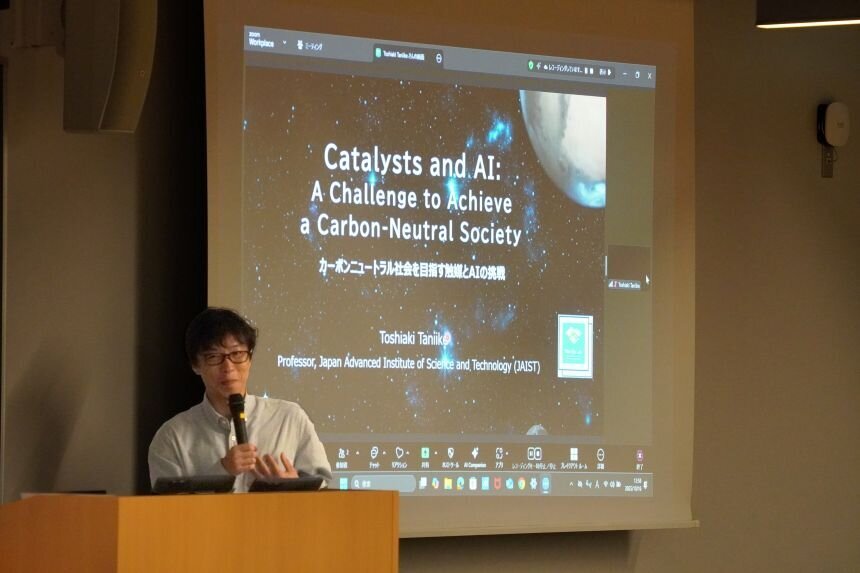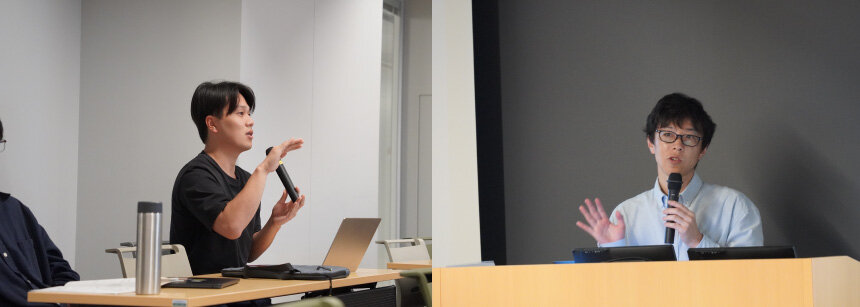NEWS
NS Forum "Catalysts and AI in Pursuit of a Carbon-Neutral Society" by Professor Toshiaki Taniike of the Japan Advanced Institute of Science and Technology (JAIST) Held
Update: October 22, 2025

On October 16, 2025, Professor Toshiaki Taniike of the Graduate School of Advanced Science and Technology at Japan Advanced Institute of Science and Technology (JAIST) spoke at the NS Forum titled "Catalysts and AI in Pursuit of a Carbon-Neutral Society" held at the Troyer Memorial Arts and Sciences Hall. The NS Forum is a seminar series organized by the Department of Natural Sciences to introduce the latest technologies and research conducted by external scholars. The session was moderated by Professor Wang Jae Chun (major in Chemistry and Environmental Studies). As ICU and JAIST have maintained a recommendation-based admission agreement since 2014, the event concluded with an introduction to JAIST.
At the start of the lecture, Professor Taniike explained the impacts of global warming and the need for carbon neutrality, using data from the Intergovernmental Panel on Climate Change (IPCC). If current trends continue, temperatures are projected to rise by 2°C by 2050, which could result in a 16% loss of plant diversity and a 99% loss of coral reefs, severely affecting agriculture and fisheries. He emphasized that controlling temperature rise requires transformation of our material-based civilization.
Accordingly, Professor Taniike focused on catalysts, which impact 80% of chemical processes and 35% of GDP. A catalyst, he explained, induces significant outcomes without undergoing change itself, guiding chemical processes to produce specific compounds. Catalysts are indispensable in producing polymers used in OLEDs, diapers, and PET bottles, for example, and in fluid catalytic cracking, which converts crude oil into gasoline. Discovering new catalysts capable of creating materials from waste or generating hydrogen without CO₂ emissions could help transform today's fossil-fuel-dependent society, according to Professor Taniike.
However, even in the case of simple oxidation of carbon monooxide, each of the complex chemical processes involved, such as molecular adsorption, separation, and absorption, requires its own catalyst design. As a result, researchers must search for an enormous number of new catalysts. Also, catalytic reactions vary depending on the conditions (parameters), which entails an immense amount of experimental work. Up to now, the discovery of catalysts has relied on hypothesis-driven experimentation, such as the 20,000 trials that led to the discovery of the Haber-Bosch process, or on accidental findings. Given the virtually infinite number of possibilities, there are clear limits to discovering unknown catalysts and achieving breakthroughs by 2050 through these traditional methods. To overcome these constraints, Professor Taniike turned to AI. By combining various elements to create candidate materials for new catalysts, and then correlating them with different parameters, AI can predict promising candidates (a shift from hypothesis-driven to data-driven discovery). However, such AI prediction requires vast training data (e.g., 10,000 data points), and existing experimental data are insufficient. To address this and gather such data, Professor Taniike's team developed an efficient device that can automatically conduct experiments from synthesis to evaluation without human intervention. By running 4,000 experiments per day, they created the conditions necessary for AI to learn effectively. They also developed a technology that enables AI to generate descriptors, a method of representing high-dimensional characteristics as low-dimensional numerical values, since the descriptors of unknown catalysts are not yet known. By leveraging these technologies, Professor Taniike reported that AI was able to propose about 120 new catalysts, including several "champion catalysts," from among one billion potential catalyst material candidates, roughly three times the number of known catalysts (around 40).

In the post-lecture Q&A session with students and faculty, discussions covered topics such as whether, in the future, machines rather than humans could define target variables, and the need for continued dialogue between academia and industry regarding the industrialization of new catalysts.
Students who attended the lecture commented that it was fascinating to know chemical experiments and research are being conducted using machine learning and AI, and that they would like to hear more from this speaker in the future.
It was a valuable opportunity to learn about cutting-edge research focused on discovering catalysts that will play a key role in achieving a carbon-neutral society.
Lastly, in the JAIST introduction session, Professor Taniike highlighted its features, including the opportunity to conduct research alongside leading scientists in a well-equipped environment, the flexibility for students to change research fields based on the belief that interdisciplinary thinking is essential for new discoveries, and the availability of coursework tailored to each student's background. The upcoming Open Campus event (on November 15) was also announced. ICU undergraduates interested in applying to JAIST through the recommendation-based admission program should contact the College of Liberal Arts Group for more information.
